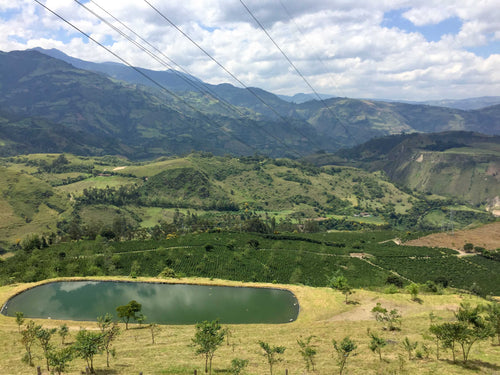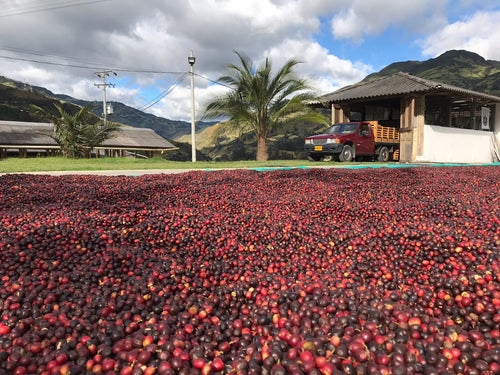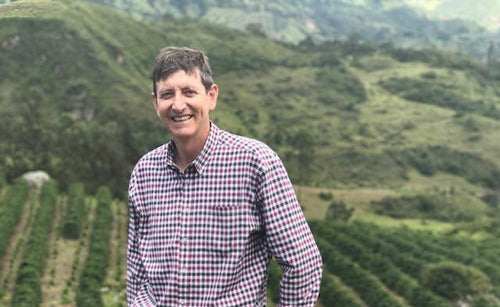Pablo Guerrero is one of the first coffee farmers that our buyer Micah met more than a decade ago. That was with another company, and El Obraje was much less known then. Pablo's farm has an unusual number of distinct microclimates, and his best coffees are planted at the highest elevations, some of them up to 2,600 meters above sea level.
Micah competed in the USBC (United States Barista Competition) with Pablo's coffee and placed 7th, so we have a lot of love for it. The following year, Andrea Allen from Onyx Coffee Lab won the USBC with Pablo's coffee. In the years since, Pablo has gone from strength to strength, and this year's harvest is absolutely delicious. We think it tastes like a citrusy burst of bergamot, orange, and nectarine.
We've stocked Pablo's coffee every year since the beginning of Skylark, and it's always been a popular one. It will probably sell out fast, so get in there if you're a washed coffee lover!
For a little more about Pablo's farm, read on below ...
Mr. Pablo Guerrero was the first to introduce coffee to the Tangua area outside of the city of Pasto in the year 2000. Hacienda El Obraje has been in Pablo’s family for many years and originally produced wheat and other grains. In the 1990s, the Colombian government began importing grains, since cultivating wheat was no longer viable. Looking for an alternative, Pablo and his team experimented with fruit trees, including apples and peaches, for ten years, but challenges like bringing fresh fruit to market made fruit cultivation unsuccessful. When Pablo first began planting coffee in 2000, he grew traditional, conventional coffee and did not have a mill. By 2009, he had built a facility to process his own coffee and entered into the specialty coffee market. His experiments continued — he planted new varieties and processed natural as well as washed coffees. Planting coffee was initially risky because he was unsure how productive coffee would be at such a high elevation, but the coffee trees flourished and now others are following in his footsteps.
The climate and terrain of Obraje are major contributing factors to this coffee’s unique cup profile. Temperatures vary greatly in a day, from 32 degrees Celsius at noon to 8 degrees or less at night. In the rainy season, the humidity is high, and it is nearly impossible to dry coffee on raised beds. Initially, planting shade trees would have been disadvantageous given the humidity, as they would have trapped too much moisture and caused diseases, but the coffee has adapted to its conditions and Obraje now has low-density shade trees planted along with coffee trees. The drastic daily change in temperature impacts the density of the coffee beans and also causes trees to be smaller and more compact than trees of the same varieties in other regions of Colombia. Obraje often does not receive adequate rainfall and must irrigate select lots using water from the farm’s retention pond. Obraje is located near many volcanic mountains and the rocky soil is filled with minerals. Obraje maintains its own nursery to take care of coffee trees in their early stages. The team plants seeds directly into 2kg soil bags to let the seedlings grow before replanting them in the field. The farm applies mixed fertilizations of 1kg to 2kg of natural fertilizer and 300g of chemical fertilizer per tree.
El Obraje’s wet mill on the property is extremely tidy and includes tile fermentation tanks, depulping equipment, mechanical oven dryers, and raised drying beds under a solar dryer. Coffee processing begins as soon as the cherries are harvested. All processing times vary according to the climate at the time of harvest. Normally, cherries are fermented for 20 hours in the same bags the pickers use. Cherries are selectively harvested for ripeness and sorted by flotation. After depulping, coffee is dry fermented for another 24 hours and then fully washed, concluding with a second flotation sort. Washed coffee typically dries for an average of 16 days on raised beds or 4 days in the mechanical parchment combustion dryer, where it receives a hot air flow of 30 degrees Celsius.
Elevation: 2200 Meters Above Sea Level
Varietal: Blend
Cup score: 88
Price paid per kg: £10.12
Process: Fully washed


